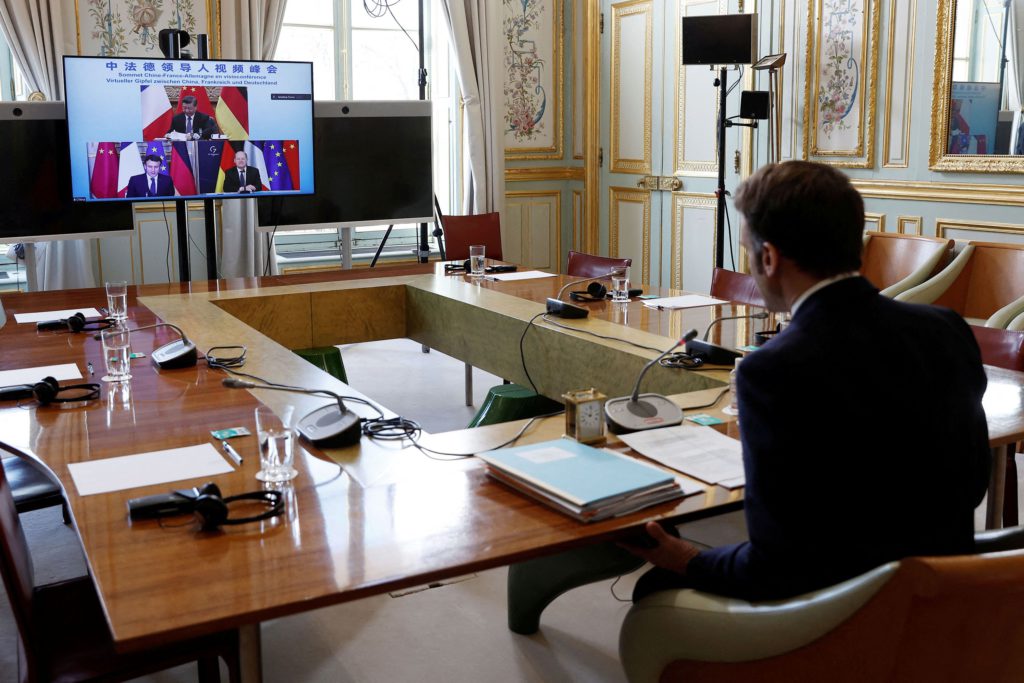(Bloomberg) — A flurry of diplomatic calls between Beijing and European capitals shows how President Xi Jinping is trying to keep Russia’s invasion of Ukraine from dragging China into the center of another struggle for global supremacy reminiscent of the Cold War.
Xi spoke via video link Tuesday with French President Emmanuel Macron and German Chancellor Olaf Scholz, suggesting China would be willing to work with the two countries to mediate a solution. The summit follows Foreign Minister Wang Yi’s calls with top regional diplomats including Josep Borrell of the European Union and Peter Szijjarto of Hungary.
The outreach to Brussels was consistent with China’s approach before the war of courting stronger European ties to balance Washington’s efforts to build a more united front against Beijing and Moscow. Russian President Vladimir Putin’s attack on Ukraine has made that challenge more urgent, leading even some of Europe’s most dovish leaders to suddenly embrace U.S.-led sanctions campaigns and demands for greater military spending.
“It is a critical moment for Europe-China relations,” said Noah Barkin, an expert on Europe-China relations at U.S. research firm Rhodium Group. “If Beijing stays on the sidelines and continues to blame the U.S. and NATO for provoking Putin, then this could do lasting damage to its relationship with Europe. The democracies-versus-authoritarians narrative will take hold. China and Russia will be seen as a common threat.”
China and Russia have grown closer as they’ve found themselves increasingly locked in parallel battles with the U.S. over spheres of influence and what Washington sees as the erosion of postwar liberal norms. That process culminated last month with a Xi-Putin summit in Beijing, at which the Chinese leader endorsed Russian grievances with NATO and declared their relationship to have “no limits.”
China’s Fears of an Indo-Pacific NATO Are More Myth Than Reality
Russia’s subsequent invasion left Xi in a tough spot, needing to preserve ties with Putin without alienating Europe, where the attack on Ukraine is widely viewed as an attack on itself. China has so far sought to maintain a neutral position, urging dialogue and the protection of civilians while blaming the U.S. for fomenting the conflict and abstaining from United Nations votes condemning Russia.
Xi continued that approach in his summit with Macron and Scholz, saying the “Chinese side is deeply grieved by the outbreak of war again” in Europe, according to a Foreign Ministry summary. “The pressing task at the moment is to prevent the tense situation from escalating or even running out of control,” Xi said, citing concerns about energy, supply chains and the post-pandemic recovery.
China Tensions Spill Over as Europe Moves Toward Biden’s Side
“Europe is now more reliant on the U.S. for energy and security,” said Wang Yiwei, a former Chinese diplomat and director of Renmin University’s Institute of International Affairs. “That’s not something Europe wants. So that’s why Xi said China supports Europe’s strategic autonomy.”
While Xi has spoken with Putin and Macron since the invasion began, he hasn’t spoken with U.S. President Joe Biden or U.K. Prime Minister Boris Johnson, the remaining two permanent members of the UN Security Council. He also hasn’t talked with Ukrainian President Volodymyr Zelenskiy, although foreign ministers from the two countries have spoken.
China’s strong ties with Ukraine — including its status as the country’s second-largest trading partner behind the EU in 2020 — have led some in Europe including Ukrainian Foreign Minister Dmytro Kuleba to urge Beijing to mediate. Moscow’s dependence on Beijing to offset sanctions appears to give Xi a bit of leverage: Putin opened talks with Zelenskiy shortly after the Chinese and Russian leaders spoke, though they went nowhere.
China as Mediator?
China hasn’t yet embraced a mediation role in the crisis, which carries both risk and rewards. “Beijing will not want to increase its exposure to the conflict, and its view of the U.S. and NATO as adversaries will prevent it from aligning positions with the West,” said Helena Legarda, lead analyst at the Berlin-based Mercator Institute for China Studies.
Successful negotiations, however, could improve views of China as a responsible global leader, while failure could further entangle it in the centuries-old security disputes of Europe.
Instead, Xi told Macron and Scholz that China supported “an equal-footed” security dialogue between the EU, Russia, the U.S. and NATO, a framework that emphasized Brussels’s autonomy from Washington. China has sought return to the Minsk agreements that helped ease the first flareup in fighting between Russia and Ukraine, a process that excluded the U.S.
“It’s not in the Chinese interest to have the EU and the United States get too close together, and the longer this war lasts, the closer the EU and the U.S. will move,” said Wolfgang Roehr, a former German diplomat in China and senior research fellow at the German Studies Centre at Tongji University in Shanghai. “I don’t think that’s in China’s interest, and the Europeans know that.”
(Updates with expert comment in 11th paragraph.)
More stories like this are available on bloomberg.com
©2022 Bloomberg L.P.











